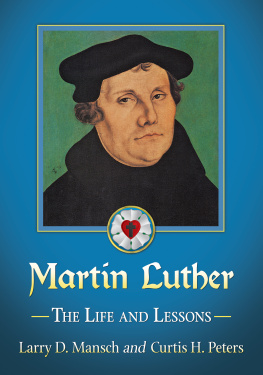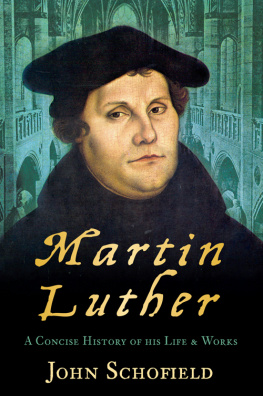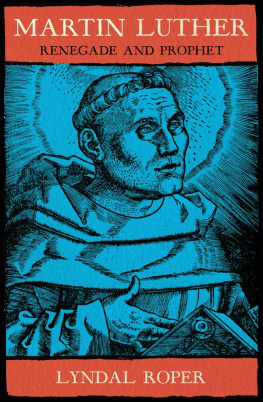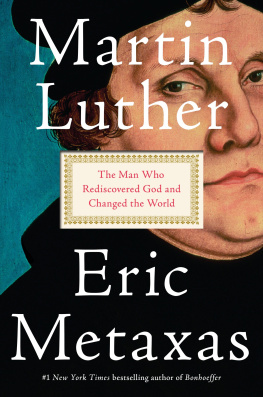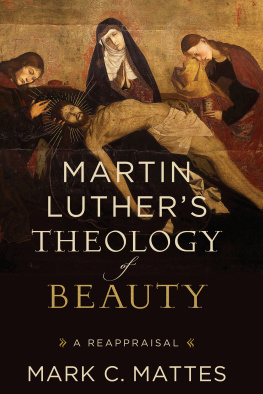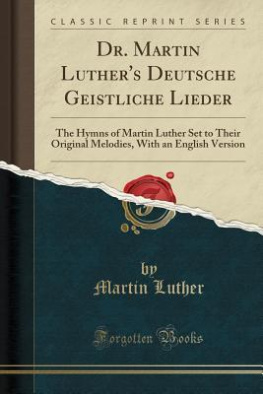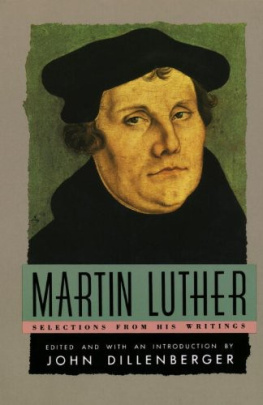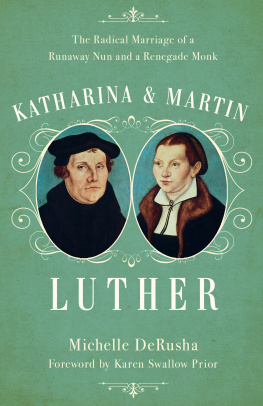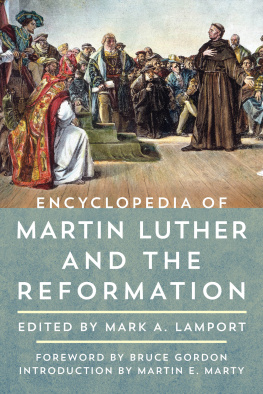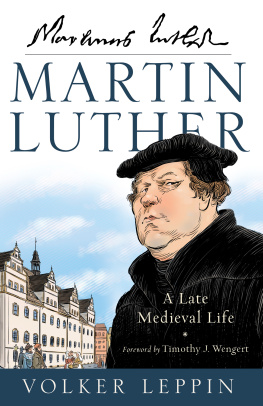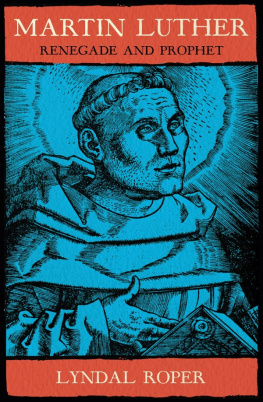Contents
About the Book
Martin Luther changed Europe and, through Europe, the world. It was he who finally exposed the myth of a unified Latin Christendom, which was only held together by crusades, heresy hunts, Inquisition, and priestly magic. Though not the first radical thinker to challenge papal pretensions and the doctrines they were founded on, by his defiance Luther created the biggest cause clbre of the age. But this renegade monk did not just split Europe into rival Protestant and Catholic camps. By urging Christians to read and interpret the Bible for themselves, he gave a religious boost to that emancipation of the individual we associate with the Renaissance. By putting men and women in charge of their own destinies he made a cultural impact which is incalculable.
This first major biography in English for many years, by leading historian Derek Wilson, responds to recent Reformation scholarship to assess Luthers impact on his own and later ages. A warts-and-all study, it gives a vivid picture of a complex and driven man courageous, stubborn, rumbustious, vulgar, erudite, self-opinionated but a man of tireless energy and, above all, total conviction. For his achievements we can admire him. In his failings we can identify with him. Luther remains perpetually fascinating.
About the Author
Derek Wilson is well-known through his books, radio and TV appearances, frequent journalistic features and festival appearances as one of the UKs leading narrative historians. Among his critically acclaimed and bestselling books are The King and the Gentleman: Charles Stuart and Oliver Cromwell 15991649; In the Lion's Court: Power, Ambition and Sudden Death in the Reign of Henry VIII; All the King's Women: Love, Sex and Politics in the Life of Charles II and Charlemagne: The Great Adventure.
Derek Wilson is the organiser of the Cambridge History Festival. For further information visit his website: www.derekwilson.com.
Also by Derek Wilson
Rothschild: A story of Wealth and Power
Sweet Robin: Robert Dudley, Earl of Leicester
Hans Holbein: Portrait of an Unknown Man
The King and the Gentleman: Charles Stuart and Oliver Cromwell 15991649
In the Lions Court: Power, Ambition and Sudden Death in the Reign of Henry VIII
All the Kings Women: Love, Sex and Politics in the Life of Charles II
Charlemagne: The Great Adventure
List of Illustrations
Detail from Law and Grace, Lucas Cranach the Elder, c. 1530
The Schutzmantelbild. From Ulrich Tenglers Mirror for Laypeople, 1509
Albrecht Drer, The Four Horsemen of the Apocalypse, 1498
Savonarola preaching in the Duomo. From Compendio di Revelazione, Florence, 1496
Jews being tortured, 1475
The Drummer of Niklashausen by Hans Beheim. From Hartmann Schedel, Weltchronik, 1493
The martyrdom of Jan Hus, 1524
Luther sanctified, Hans Baldung Green. From Acta et res gestae D Martini Lutheri, Strasbourg, 1521
Johann von Staupitz, engraving after a painting in St. Peters Abbey, Salzburg
Archduke Frederick of Saxony, The Wise, Albrecht Drer, c. 1524
Wittenberg, engraved by Matthus Merian
Albrecht Drer, The Adoration of the Magi, 1504
The Sale of Indulgences, date unknown
Leo X, engraving by Marcantonio Raimondi
Luther and the devil different perspectives
The papal bull, Exsurge Domine
Luther the German Hercules, Hans Holbein, 1523
The Imperial Diet from a 17th-century map by Hermann Moll
Luthers lodging in the Wartburg, 15212
Andreas Bodenstein von Karlstadt, date unknown
Thomas Mntzer preaching. Woodcut from The Prophecies of Johann Lichtenberg, 1527
The Divine Mill. From M. Ramminger Dyss hand zwen shwytzer puren gemacht, Augsburg, 1521
Title page of Luthers tract Against the Thievish, Murderous Hordes of Peasants, 1525
Lady Music: Verse introduction by Luther to John Walthers Glory and Praise of the Laudable Art of Music, 1538
Lucas Cranach the Elder, True and False Religion, c. 1545
Title page of Luthers Bible, 1534
Title page by Lucas Cranach for Luthers Against the Roman Papacy, an institution of the Devil, 1545
Luther in the last years of his life, Lucas Cranach, 1546
Out of the Storm
The Life and Legacy of Martin Luther
Derek Wilson

Introduction
TO BE GREAT is to be misunderstood and I suppose it follows from Emersons dictum that the great must suffer the attentions of generations of biographers all claiming to understand them. Martin Luther was a seminal figure in the progress of western thought, as intensely controversial in his own day as his ideas have been controversial ever since. He was a massive mountain dominating the historical landscape so that it is impossible to ignore him and equally impossible to deny his significance. His own internal struggle to find meaning and purpose in life became so dramatically externalised as to make him a representative man for the ages. His intellectual depth was combined with a vigorous journalistic style so that he could bring profound truths within the mental compass of the common man. He was one of those rare individuals who single-handedly forced the march of time into a new direction. He helped to shape sixteenth-century Europe and, therefore, seventeenth-century America, eighteenth- and nineteenth-century colonial societies worldwide, and the political ideals upon which western-style democracy rests. As such, he has not escaped the efforts of writers over the last four and a half centuries. For much of that time he was the victim of Catholic enemies who set out to vilify him and also of Protestant friends intent on rejecting every slur on their heros character. But Brother Martin was always too big to be monopolised by the Church and certainly too big to be made captive by one section of it. He has been claimed as a great German nationalist, as a proto-Marxist who freed ordinary people from ecclesiastical tyranny and even, in John Osbornes play, Luther, as a free-thinking, coarse-mouthed role model for anti-establishment youth.
My own objective in Out of the Storm is simple but certainly not modest. I want to provide the non-specialist reader with an account in English of the life of Martin Luther, warts and all, and an assessment of his impact on his own time and subsequent ages. The first part of that function has hitherto been admirably fulfilled for millions of people by Roland Baintons Here I Stand. Writing in the immediate aftermath of the Second World War, this American scholar produced a sensitive and sympathetic religious biography of one of the greatest of all Germans, a man widely regarded in his own country as one of the fathers of German nationalism. Baintons work originated in lectures delivered to theology students at Yale, Hartford, Bonebrake and Gettysburg seminaries but it worked for non-specialists because it broke out of the prison of dry, earnest, partisan controversy which still dominated intellectual debate and told the heroic story of a great individual.
So, why reinvent the wheel? I believe there are two compelling reasons for retelling the Luther story in popular format for a new century: the world has changed and Reformation scholarship has changed. The students for whom Bainton wrote and the same doubtless holds good for many outside the lecture hall who read and enjoyed
Next page

